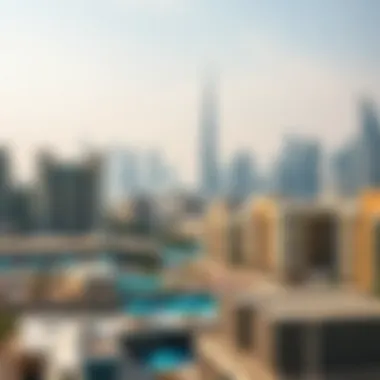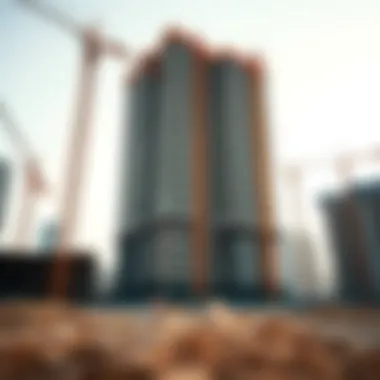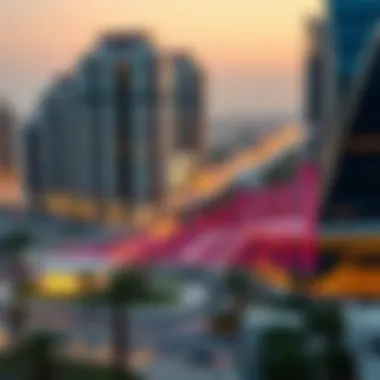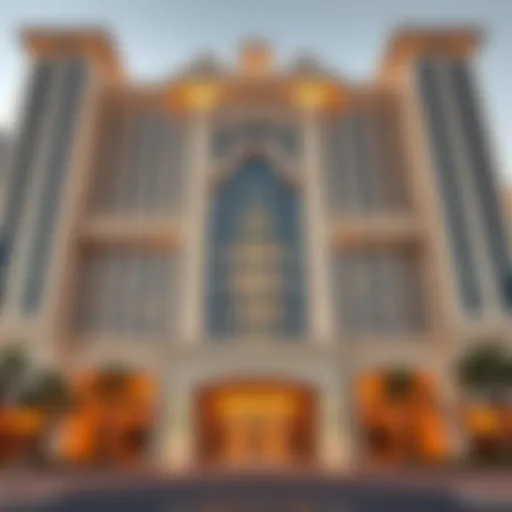Key Players in Dubai's Real Estate Development Sector


Intro
Navigating the bustling landscape of Dubai's real estate market may feel like trying to find your way through a maze without a map. With a blend of towering skyscrapers, luxury villas, and emerging neighborhoods, this sector mirrors the rapid transformation of the region itself. In addition to its iconic architecture, the market is shaped by influential developers whose investments and innovations carve the way for future opportunities.
This examination seeks to illuminate the realm of real estate developers in Dubai. Rather than skimming the surface, we will delve into the intricate layers that define this vibrant market. We’ll consider the evolution of significant projects, the ebb and flow of investment trends, and the frameworks governing real estate transactions.
Armed with insights and analysis, investors, agents, buyers, and analysts will be better equipped to make informed decisions in this dynamic industry. By exploring the market's trends and investment opportunities, we aim to clarify what lies ahead in the ever-evolving landscape of Dubai real estate, reassuring that there’s more than just sand and sun at the heart of this economy.
Market Trends
Current Market Analysis
The real estate market in Dubai is akin to a game of chess—strategic moves determine winners and losers. As of late 2023, the market has shown resilient growth despite global economic uncertainties. Significant demand continues to come from both local and foreign investors, largely driven by the city’s appeal and the government's commitment to long-term economic diversification.
Recent statistics highlight a surge in property transactions, particularly in luxury segments. Prices in popular districts have escalated, reflecting the underlying demand. Whether it's the elegant waterfront views of Dubai Marina or the grandeur of Downtown Dubai, there are no signs of slowing down.
"In Dubai, property investment is not just about the present; it’s also a ticket to the future."
Future Predictions
Looking into the crystal ball, the future of Dubai's real estate looks promising. Analysts predict that the ongoing expo events and international sports activities will further bolster real estate demand. Moreover, with regulatory revisions aimed at enhancing transparency and investor protection, stakeholders can expect a more favorable environment.
As developers pivot towards sustainability and smart technologies, the market will likely be filled with green buildings and futuristic designs. Neighborhoods that once underwent urban renewal are now poised to become magnets for property interest. Growth is anticipated particularly in regions favoring eco-living and community engagement.
Investment Opportunities
High-Return Areas
Identifying lucrative investment spots within Dubai can often resemble piecing together a complex puzzle. Notable areas currently seizing attention include:
- Dubai Hills Estate: Known for its expansive green spaces and proximity to the city center.
- Bluewaters Island: Offers waterfront living with exceptional views and high rental yields.
- Dubai Marina: Continues to attract both local and expatriate renters due to its vibrant lifestyle.
These areas set the stage for promising returns on investment, particularly as they see ongoing developments and infrastructure enhancements.
Emerging Neighborhoods
The shifting focus from traditional hotspots to emerging neighborhoods presents exciting investment avenues.
- Dubai Creek Harbour: Envisioned to be a futuristic hub with sustainable infrastructure and abundant amenities.
- Jumeirah Village Circle (JVC): Marked by affordability and potential capital appreciation, it’s gaining traction among young families.
As these neighborhoods undergo various phases of development, investors are wise to pay attention, as early entry can lead to substantial gains in property value down the line.
With a mix of dynamic market trends and emerging investment opportunities, there is much to unpack in Dubai's real estate landscape. The insights gathered here prepare investors and stakeholders to better understand the complexities while positioning them to navigate a flourishing market.
The Evolution of Dubai’s Real Estate Market
The trajectory of Dubai's real estate market is as fascinating as it is complex. Emerging from a modest beginning, the emirate has transformed into a global hub for real estate investment and development, largely due to strategic insights from both local and international players. Understanding the evolution of this market is essential for various stakeholders, including investors, agents, buyers, and analysts, as it offers a clearer picture of opportunities and challenges present in this dynamic field.
Notably, the progression of this sector reflects broader economic and social transformations that Dubai has undergone. The real estate landscape here is not only shaped by market demands but also by geopolitical shifts and innovative policies adopted by the government. By tracing its historical context and acknowledging significant development milestones, one can glean valuable information about how to navigate the current market effectively while preparing for its future.
Historical Context
The historical context of Dubai’s real estate market provides a foundational understanding necessary for stakeholders looking to invest or operate in this arena. Initially, the landscape was dominated by low-rise buildings mainly catering to local residents. The discovery of oil in the 1960s marked a seismic shift, enabling the emirate to invest in and develop its real estate infrastructure.
During the 1980s, the government began laying the groundwork for a more diversified economy. However, it was the 1990s that truly set the stage for the real estate boom experienced later. A series of initiatives, including foreign ownership laws, increased tourism, and the establishment of free zones, catalyzed a surge in investment and consumer interest.
Major Development Milestones
Several key milestones have defined the evolution of Dubai's real estate market:
- Burj Al Arab (1999): This iconic structure not only put Dubai on the map as a luxury destination but also symbolized the emirate's ambition to attract high-net-worth individuals.
- The Palm Jumeirah (2006): This innovative man-made island lifestyle project represented a pioneering endeavor in real estate development and demonstrated the emirate's commitment to creating unique and sought-after properties.
- Dubai Metro (2009): The opening of the metro significantly enhanced connectivity and fueled residential and commercial development along its route.
- Expo 2020 Preparations (planned for 2021): Investments and developments related to this major global event showcased the emirate's potential as a key player on the world stage.
Understanding these milestones helps investors and analysts appreciate the broader trends that have shaped the market while anticipating future directions. The evolution of the real estate market in Dubai is not just about bricks and mortar; it reflects a vision that extends beyond the skyline, embracing technology, sustainability, and the global economy.
Key Real Estate Developers
The role of key real estate developers in Dubai's property market cannot be understated. These influential entities are not just responsible for constructing buildings; they shape the very skyline of the city and play a pivotal role in bolstering the local economy. Developers forge partnerships with local and international investors, aligning with statutory frameworks that guide development practices. Furthermore, they contribute significantly to infrastructure growth, attracting tourists, businesses, and residents from all over the globe.
Developers are crucial for various reasons, and among these is their ability to identify changing consumer preferences. In a market as dynamic as Dubai’s, developers need to adapt swiftly to trends, such as sustainable practices, luxury amenities, and smart technologies in properties. This adaptability not only enhances property value but also increases the competitive edge in a saturated market.
Prominent Players in the Market
When discussing prominent players in the Dubai real estate landscape, names like Emaar Properties, Damac Properties, and Nakheel come to mind almost immediately.
- Emaar Properties: Known for iconic projects like the Burj Khalifa and Dubai Mall, Emaar reshaped residential and commercial spaces in the city. Their focus is on creating experiences that go above and beyond mere living spaces; they set benchmarks in customer service and quality.
- Damac Properties: An international real estate development company, it emphasizes luxury living. Damac is famous for its extravagant developments that appeal to high-net-worth individuals.
- Nakheel: This developer is synonymous with transforming Dubai's coastline through ambitious projects like the Palm Jumeirah, showcasing the art of urban planning and design.
These companies don’t just build; they create environments. They set trends in sustainability, community planning, and architectural innovation.
Emerging Developers
On the other hand, emerging developers are carving their niche in the market as well.
- Azizi Developments has gained attention for well-priced luxury apartments, positioning itself as a competitive alternative in the market. Its focus is on customer satisfaction and quality construction.
- Majid Al Futtaim is another up-and-comer that emphasizes mixed-use developments, uniting residential, retail, and leisure spaces in one cohesive environment.
- SELECT Group has made waves with its focus on lifestyle developments, catering to young families and professionals wanting to settle in vibrant, community-centered neighborhoods.
These newer players often emphasize innovation and sustainability, which can be vital differentiators in today’s real estate climate.


"As the city evolves, so too does the approach of these emerging developers, reflecting the need for adaptive construction methods and community-oriented designs."
Types of Properties Developed
Understanding the types of properties developed in Dubai is crucial for anyone involved in the real estate scene, be it investors, agents, or analysts. Each category of development plays a distinct role in shaping the market and reflects the evolving preferences of consumers. Grasping the differences between residential, commercial, and mixed-use properties not only aids in making informed decisions but also highlights emerging trends that can dictate future investment opportunities.
Residential Developments
Residential developments in Dubai have witnessed a metamorphosis over the years, responding to the diverse demographic landscape. From luxurious villas in areas like Palm Jumeirah to high-rise apartments in Downtown Dubai, the variety ensures that every buyer finds something that fits their taste and budget. The surge in population, fueled by expatriates and locals alike, contributes to an insatiable demand for housing.
- Key considerations for residential developments include:
- Location – proximity to essential amenities such as schools, hospitals, and shopping centers.
- Design and aesthetics – properties that are visually appealing tend to attract buyers faster.
- Price point – affordability can either draw interest or push potential tenants away.
The rush for residential spaces has been accompanied by innovative designs and smart technologies embedded into these homes. Developers are not just putting up walls; they are creating communities that offer a lifestyle, with parks, gyms, and retail spaces integrated seamlessly.
Commercial Properties
On the commercial front, Dubai’s skyline is peppered with office skyscrapers that symbolize the booming business environment of the city. From multinational companies setting up shop in Dubai Internet City to hospitality giants establishing their presence in buzzing districts like Business Bay, the landscape is vast.
- Important aspects of commercial properties are:
- Demand trends – market needs can fluctuate based on economic cycles, necessitating adaptive strategies for developers.
- Lease terms – long-term versus short-term leases can significantly impact cash flow and financial planning.
- Accessibility – commercial spaces that provide ease of access tend to have higher rental rates.
The shift towards co-working spaces signifies the changing preferences of businesses that value flexibility. Developers responding to this trend are designing open layouts that foster collaborative environments, meeting the demands of startups and freelancers.
Mixed-Use Developments
Mixed-use developments are at the forefront of urban planning innovations in Dubai. These projects ingeniously blend residential, commercial, and recreational spaces, creating self-sufficient communities. They enhance lifestyle convenience by merging living, working, and entertainment environments within a single locale.
- Benefits of mixed-use developments include:
- Enhanced community engagement – by bringing different demographics together, these spaces promote interaction and engagement.
- Increased property value – properties within mixed-use developments often appreciate faster due to their versatility and desirability.
- Sustainability – the integrated nature inherently reduces commuting times and carbon footprints.
This trend toward mixed-use spaces fulfills both consumer desires for convenient living and developer needs for sustainable growth. The rush to develop such properties is a response to shifting global urbanization patterns.
Ultimately, each type of property serves as a vital cog in the larger machine of Dubai’s real estate ecosystem. Keeping an eye on these trends can provide astute investors with clues about where to place their bets in this dynamic market.
"The property landscape in Dubai is not just about buildings; it’s about creating a lifestyle that resonates with the aspirations of its residents."
For those interested in more details, the following resources can be helpful:
Market Trends and Analysis
Understanding the market trends and analysis within Dubai’s real estate sector is critical in deciphering its current landscape and future trajectory. With Dubai being a hub for trade, tourism, and innovation, the real estate market reflects both local and international influences. This analysis helps investors, agents, and analysts identify patterns, areas of growth, and potential pitfalls. By examining market dynamics, stakeholders can make informed decisions, maximizing both short-term gains and long-term investments.
Current Market Dynamics
Dubai's real estate market remains dynamic, shaped by various factors. Foremost among these is the socioeconomic landscape, characterized by a growing expatriate population and a continued influx of tourists. As more people consider Dubai as not just a place of work but as a place to settle down, residential spaces are experiencing a notable uptick in demand. This has led to developments in different segments, from luxury villas in Arabian Ranches to affordable housing in Al Quoz.
However, it is crucial to note how government regulations play a pivotal role in shaping these dynamics. Initiatives aimed at attracting foreign investment, such as the introduction of long-term visas for expatriates and 100% foreign ownership of businesses, have generated optimism.
Additionally, there’s a notable push toward Dubai’s 2040 Urban Master Plan, which emphasizes sustainable developments and urban connectivity. This plan aims to incorporate more green spaces and improve public transport, thereby boosting the appeal of various real estate offerings.
"Economic indicators suggest that demand for both residential and commercial properties may remain robust, influenced largely by infrastructure developments and tourist activities."
It’s also evident that technology influences current trends. Smart home features and eco-friendly materials are highly sought after, responding to changing consumer preferences. Market players are adopting innovative technologies, and buyers are increasingly prioritizing properties that offer advanced facilities.
Predictive Analysis of Future Trends
Looking ahead, predicting future trends requires a closer examination of several guiding factors. One key area of focus is the rise of smart cities. As technological advancements continue to reshape urban landscapes, we can expect future developments in Dubai to prioritize connectivity, efficiency, and sustainability. Projects incorporating Artificial Intelligence and Internet of Things (IoT) will likely enhance the living experience, catering to tech-savvy buyers.
Moreover, demographic shifts can’t be ignored. Gradually, younger generations are entering the workforce and becoming property buyers. They tend to favor urban living with access to entertainment and lifestyle amenities, further pushing the demand for mixed-use developments. They appreciate flexibility, such as co-working spaces, which encourage a community feel.
Another trend to watch is the increasing integration of sustainability within real estate practices. Developers are likely to adopt rigorous green building standards. It won't just be about meeting regulatory requirements; it will also be about appealing to a more environmentally conscious buyer base. Expect to see many projects certified by LEED (Leadership in Energy and Environmental Design), appealing to environmentally-aware investors.
Investment Opportunities in Dubai
The real estate market in Dubai has always been a hotspot for investors, both local and foreign. This section will delve into investment opportunities in Dubai, highlighting why this topic holds significance within the broader analysis of the sector. The emeging developments, regulatory frameworks, and unique market characteristics have made Dubai an in-demand location for property investment, rivaling cities like New York and London.
Identifying High-Yield Investments
Identifying high-yield investments in Dubai involves a careful assessment of various property sectors, including residential, commercial, and mixed-use developments. Investors often look for properties that not only offer immediate returns but also potential for capital appreciation.
- Residential Developments: High-growth neighborhoods, such as Dubai Marina and Jumeirah Village Circle, frequently yield solid returns. These areas have seen a consistent influx of expatriates, driving demand for rental properties.
- Commercial Properties: With Dubai positioning itself as a global business hub, investing in office spaces or retail outlets can result in strong yields, especially in areas like Business Bay or Downtown Dubai.
- Mixed-Use Developments: Projects that combine commercial, retail, and residential spaces are gaining traction. These developments tend to create a vibrant community, appealing to investors looking for a well-rounded portfolio.
Potential buyers should conduct thorough market research and consider metrics such as rental yields, occupancy rates, and economic indicators before jumping in. Collaborating with seasoned real estate agents can also lend invaluable insights.
Risk Assessment Strategies
Understanding the risks associated with real estate investments in Dubai is equally important. Here are some strategies to mitigate risks:
- Market Research: Investors should keep tabs on market trends, property prices, and economic signals. Staying informed will allow for timely decisions.
- Diversification: Spreading investments across different property types and locations can help buffer against market volatility.
- Legal Due Diligence: Engage with legal experts to navigate the intricacies of Dubai’s real estate laws. This ensures compliance with local regulations and safeguards investments against potential disputes.
- Engaging Property Management: For those investing in multiple units or commercial properties, hiring a reputable property management firm can alleviate concerns around tenant management and property upkeep.


In summarizing, the investment landscape in Dubai remains ripe with opportunities, yet it carries its share of challenges. An informed approach can enhance the chances of lucrative returns.
"Investing is not just about seeing numbers; it's about understanding the story behind those numbers."
For further insights on real estate in Dubai, you can read articles from sources like Wikipedia and Britannica.
Keep exploring to understand how different investment strategies can lead to success in the bustling Dubai real estate market.
Regulatory Framework Governing Developers
The regulatory framework governing real estate developers in Dubai is a pivotal element that shapes not only the development landscape but also investor confidence and market stability. With a burgeoning real estate sector, the laws and regulations set by local authorities delineate the boundaries within which developers operate, ensuring that projects adhere to predefined standards and contribute positively to the city’s growth. This section will delve into the nuances of local laws and their effectiveness, as well as the impact of these regulations on development practices.
Understanding Local Laws
Understanding local laws is essential for anyone involved in the real estate market in Dubai. The legal environment is comprehensive, encompassing various aspects such as zoning laws, property ownership regulations, and safety codes. One of the key pieces of legislation is the Dubai Land Department Law, which lays out the procedures for property transactions, registration, and the rights of both buyers and sellers. These laws are designed not only to protect stakeholders but also to promote orderly development in line with Dubai's vision.
Many developers start by familiarizing themselves with Law No. 7 of 2006, which governs real estate development in Dubai. This law emphasizes the need for developers to obtain all necessary approvals before commencing construction. It defines the roles and responsibilities of each party involved in a real estate transaction, from developers to property managers, ensuring accountability.
Furthermore, there are stringent environmental guidelines that developers must adhere to, captured under the Dubai Environmental Law. This ordinance mandates sustainable practices in development projects, reinforcing the commitment to building a green and resilient city.
Impact of Regulations on Development Practices
The regulations set in place have a significant impact on development practices. Firstly, they incentivize developers to maintain high building standards and safety measures. By adhering to these laws, developers not only avoid legal pitfalls but also enhance their market reputation, which is paramount in a competitive landscape like Dubai.
Additionally, strict regulations help in curbing issues such as overdevelopment and urban sprawl. These measures ensure that there is adequate infrastructure to support new developments, aligning with the city’s strategic urban planning initiatives. For example, a developer looking to undertake a large-scale residential project must factor in local infrastructure capabilities, such as public transport availability and access to utilities.
"Regulations act as a double-edged sword; they can be seen as obstacles, yet they ultimately guard against chaos, ensuring that the landscape thrives on sound principles."
Ultimately, the oversight provided by these regulations reassures investors that projects are bound by a stringent framework, enhancing their confidence in long-term investment stability. While some may view regulatory compliance as a hurdle, it’s essential to consider it as a safeguard for sustainable development that reflects the aspirations of both the city and its residents. In the long run, navigating through these regulations judiciously can unlock significant opportunities in the booming market of Dubai.
In summary, the regulatory framework is more than just a set of rules; it forms the bedrock upon which the real estate development industry in Dubai is built. Investors and developers alike must equip themselves with a profound understanding of these local laws to harness the full potential of the opportunities in Dubai's evolving property market.
For more insights into Dubai’s legal framework, check sources such as Dubai Land Department or visit educational platforms like Encyclopaedia Britannica.
Sustainable Development Practices
Sustainable development practices have become a paramount concern in Dubai's booming real estate sector. As the city continues to expand, the demand for environmentally responsible construction and development methods is on the rise. This shift towards sustainability not only reflects global trends but also addresses local needs for a greener future. In this section, we explore the key elements, advantages, and aspects of sustainable practices that are shaping Dubai's real estate landscape.
First off, let’s talk about green building standards. These standards are essential in guiding developers in creating structures that minimize environmental impact. Adhering to these standards involves using eco-friendly materials, implementing energy-efficient systems, and focusing on water conservation techniques.
Green Building Standards
The adoption of green building standards is not just a trend; it’s becoming a requirement in many new developments. The UAE has established its own green building guidelines, known as the Estidama system, which promotes sustainability in design, construction, and operation of buildings. Key elements of these standards include:
- Energy Efficiency: Buildings must incorporate systems that reduce energy consumption, such as high-performance windows and solar panels.
- Water Conservation: Efficient plumbing and water recycling systems help manage water usage effectively.
- Material Sourcing: Developers are encouraged to use locally sourced and recyclable materials to reduce their carbon footprint.
The benefits of adhering to these standards are multi-faceted. Not only do they contribute to environmental conservation, but they also enhance a property’s market appeal. Buyers increasingly prefer homes that are energy-efficient and environmentally friendly, which can lead to higher resale values.
Innovative Technologies in Construction
Next, let’s delve into how innovative technologies are changing the game in construction. In recent years, various technologies have emerged that substantially enhance the sustainability of building processes. Both traditional and modern builders in Dubai are beginning to embrace these advancements. Some notable ones include:
- 3D Printing: This technology allows for faster construction times and less waste. It’s pushing the boundaries of how structures can be designed.
- Building Information Modeling (BIM): Utilizing BIM improves planning and resource management throughout the construction phase, facilitating better energy performance.
- Sustainable Materials: Innovations such as bamboo, reclaimed wood, and recycled metals are on the rise, promoting sustainability while maintaining durability.
"Adopting innovative technologies not only optimizes construction processes but also plays a crucial role in shaping a sustainable infrastructure in Dubai," an industry expert notes.
Challenges Faced by Developers
The real estate landscape in Dubai is vibrant and full of opportunities. However, even the most ambitious developers face a slew of challenges that can hinder their projects or impact their profitability. Understanding these challenges is crucial for any stakeholder wanting to navigate this evolving marketplace. By being aware of these hurdles, investors, agents, and buyers can make informed decisions that take into consideration the intricate landscape developers must navigate.
Economic Fluctuations Impacting Development
Economic fluctuations are perhaps one of the most critical challenges facing real estate developers in Dubai. With the global economy being as unpredictable as a thunderstorm in the desert, developers must stay astute and agile. A downturn can mean decreased demand for new properties, which can lead to stalled projects and financial losses.
Consider the effects of the pandemic; while Dubai remained an attractive destination, projects were delayed and investments stifled. Developers who may have counted on steady cash flow for their projects found themselves scrambling to reassess budgets and timelines. Operating costs can spiral during such periods, making it imperative to have solid financial planning in place.
Another aspect of economic fluctuations is the competition. As various global markets fluctuate, more investors may flock to Dubai, increasing competition for prime real estate. This can inflate prices and make it more challenging for developers to secure affordable land without sacrificing profit margins.
Key Takeaways:
- Economic downturns can lead to delayed projects and financial strain.
- Competition may intensify during moments of economic uncertainty, affecting land acquisition and profit margins.
Project Management and Implementation Difficulties
Managing a real estate project in Dubai is like juggling flaming torches. The complexity of coordinating various stakeholders—from architects to contractors—often creates a landscape where miscommunication can rear its ugly head.
Developers must remain on top of regulations, timelines, and compliance standards, which often change as quickly as the desert winds. Project management tools like Gantt charts or Kanban boards may assist, but developers remain vulnerable to disruptions caused by delays in material supply or skilled labor shortages. This can happen due to broader economic trends or unforeseen local factors.
Furthermore, the challenge increases when developers aim for sustainable or innovative projects. These initiatives often demand specialized expertise, making it more crucial to bring the right team aboard. Communication breakdowns within this team can result in delays and ultimately prove costly.
"Efficient project management can be the difference between a successful development and a financial quagmire."
Important Considerations:
- Effective communication among stakeholders is essential to avoid mismanagement.
- Staying abreast of compliance and regulatory changes is critical for timely project completion.


In summary, the challenges facing real estate developers in Dubai are multifaceted. Addressing economic fluctuations with foresight and employing adept project management practices can mitigate risks and foster a more resilient development approach. Understanding these challenges equips all stakeholders to navigate the complexities of a rapidly changing market.
The Role of Technology in Real Estate Development
Technology has become a linchpin in revolutionizing various sectors, and the realm of real estate development in Dubai is no exception. As the city rapidly evolves, developers are beginning to understand that leveraging technological advancements can yield significant benefits. From enhancing efficiency in property management to providing cutting-edge tools for marketing, technology shapes how developers engage with both their projects and their clients. The integration of technology not only streamlines operations but also offers innovative solutions that can improve the overall customer experience.
Digital Platforms for Property Management
In today’s fast-paced environment, digital platforms have emerged as essential tools for property management. These platforms enable real estate developers to manage their assets more effectively, reducing operational overhead while optimizing workflow. Applications like Property Finder and Dubizzle are popular in Dubai, not merely for listing properties but also for managing listings, bookings, and client interaction.
Key benefits of these digital platforms include:
- Automation of Routine Tasks: Managing schedules, payments, and maintenance requests become seamless, allowing property managers to devote more time to strategic initiatives.
- Enhanced Communication: These platforms facilitate real-time communication between buyers, sellers, and property managers. With chat features and instant notifications, everyone stays in the loop.
- Data Analysis and Reporting: By harnessing data analytics, developers gain insights into property performance, allowing for informed decision-making. Tracking trends, occupancy rates, and client preferences can guide development strategies.
The efficiency brought by digital management tools cannot be overstated.
Usage of Virtual Tours and Augmented Reality
Virtual tours and augmented reality (AR) have started to redefine how properties are marketed and sold in Dubai. With visitors to the city often coming from various corners of the globe, offering an immersive experience can make a significant difference in attracting potential buyers. Tools such as Matterport are being utilized to create 3D models of properties, enabling prospective buyers to explore spaces without visiting in person.
The advantages are impressive:
- Wider Reach: Virtual tours allow developers to achieve a reach beyond geographical limitations. Interested buyers can tour properties from the comfort of their living rooms.
- High Engagement Levels: Virtual experiences are more engaging than traditional photos or videos. This heightened level of interaction can lead to quicker decisions from potential clients.
- Support for Customization: AR can be employed to visualize custom modifications in real-time, allowing buyers to see how changes will impact their investment before committing.
"With technology, the boundaries of conventional real estate are fading. It’s about creating experiences rather than just transactions."
The integration of these technologies showcases how Dubai's real estate developers are placing innovation at the forefront. Not only do these advancements benefit developers and property managers, but they also elevate the experience for buyers and investors. As Dubai continues to build its legacy, the role of technology will undoubtedly expand, shaping the future of real estate development in this vibrant city.
Market Insights from Industry Experts
Understanding the dynamics of the real estate market in Dubai requires more than just examining market reports and trends. It necessitates insights directly from those who shape the landscape—the industry experts. Market insights from these individuals often elucidate the complexities and subtleties that data alone cannot convey. For investors, agents, buyers, and analysts, tapping into this wealth of knowledge can lead to more informed decisions regarding investments or capitalizing on emerging opportunities.
The real estate environment in Dubai is multifaceted and constantly evolving. Engaging with leading developers and seasoned professionals provides a firsthand perspective on the factors influencing property market performance. Industry experts have their fingers on the pulse of market trends, understanding consumer preferences, and recognizing potential disruptions before they hit the general market. Their analysis can illuminate the broader implications of shifts in local and global economies, helping stakeholders anticipate changes and tailor their strategies accordingly.
Interviews with Leading Developers
Interviews with prominent developers in Dubai serve as windows into the motivations and strategies behind major projects. These conversations often reveal not only the vision for new developments but also the challenges faced during implementation.
Take, for instance, a discussion with Mohamed Alabbar, the founder of Emaar Properties, known for iconic projects like Burj Khalifa. In his perspective, it is not just about erecting high-rises but about creating a standard of living that embraces community and sustainability. He points out that the future of real estate lies in developing mixed-use spaces that resonate with modern lifestyles. His insights emphasize how a development's success hinges on meeting both aesthetic aspirations and functional needs.
Moreover, hearing directly from these developers about past experiences—what went right and wrong—can offer invaluable lessons to others in the industry. Engaging in these dialogues underscores the importance of adaptability in the face of ever-changing demands, regulations, and economic realities.
Opinions on Investment Strategies
Insights from industry experts about investment strategies reveal a spectrum of approaches tailored to the unique characteristics of the Dubai real estate market. Some experts suggest that investors should gravitate towards luxury properties, which tend to retain value well, especially among expatriates and high-net-worth individuals.
Others caution against the potential for oversupply in certain segments of the market, advocating for a thorough understanding of emerging neighborhoods. For instance, developers like Dar Al Arkan have invested in areas outside typical hotspots, banking on future demographic shifts as they predict more residents drawn to these locales seeking affordability paired with quality.
“The key is to remain versatile. The landscape changes quickly; today’s hot area can become yesterday’s news in a flash,” says Samir Mashar, a seasoned analyst.
Investment strategies informed by industry insights focus on leveraging market analytics, understanding location trends, and foreseeing regulatory shifts that could impact property values. In Dubai’s competitive market, those who stay ahead of the curve through expert guidance can better navigate the ups and downs, ensuring successful investments.
This kind of knowledge-sharing not only benefits current and potential investors but also supports a robust market environment where transparency and informed decision-making flourish.
Consumer Preferences and Behavior
Understanding consumer preferences and behavior in Dubai’s real estate market is crucial, as it directly influences developers’ strategies and investment decisions. Buyers and renters alike have distinct desires that shape the landscape of property offerings. Factors such as location, amenities, and price range play pivotal roles in decision-making processes.
Trends in Property Ownership
Dubai’s property ownership trends have shifted significantly over the years. In recent times, there’s been a noticeable lean towards freehold properties. The allure of owning property outright attracts foreign investors, especially those looking for long-term returns. In particular, areas like Dubai Marina and Downtown Dubai are often at the top of buyers' wish lists due to their prime locations and luxurious amenities.
- Investments in family homes: More families are moving to Dubai, leading to increased demands for spacious villas or townhouses. Suburbs like Arabian Ranches and Emirates Living are seeing a spike in interest, as they offer both community living and accessibility to urban centers.
- Rising interest in affordable housing: The recent economic climate has nudged buyers toward more economical options, giving rise to an uptick in interest for off-plan properties. Many are keen on snagging bargains, especially when developers offer enticing payment plans or incentives.
Shifts in Rental Expectations
Rental expectations in Dubai have also evolved, reflecting broader changes in lifestyle preferences and economic conditions. What renters expect today differs vastly from what they sought a few years ago.
- Desire for flexibility: Increasing numbers of renters are favoring short-term leases over traditional long-term agreements. This trend has intensified the demand for furnished apartments that allow for flexible living situations. Locations like Jumeirah Beach Residence are flourishing in this regard.
- Emphasis on community amenities: Today’s renters often seek properties that provide a rich array of amenities. Access to gyms, pools, and communal spaces are becoming deciding factors. Developers are recognizing this shift and are catering to it by integrating lifestyle-oriented amenities into new projects.
As the market adapts to these emerging consumer preferences, real estate developers must remain vigilant, constantly aligning their offerings with what a modern buyer or renter is searching for. It’s an intricate dance, one that necessitates an understanding of cultural nuances and market forecasts that can predict and respond to changes in the pipeline.
The Future of Real Estate Development in Dubai
The future of real estate development in Dubai holds immense significance as it represents both a response to current market trends and a proactive strategy to attract global investors. As the city aims to sustain its rapid growth while addressing emerging challenges, understanding potential developments and disruptions is crucial for investors, agents, buyers, and analysts. This section examines future projects and outlines potential disruptors that might shape the landscape of real estate in this vibrant city.
Anticipated Projects on the Horizon
Dubai is known for pushing boundaries with its innovative projects. Several anticipated developments suggest that the future is not just about building more but enhancing the quality of life and sustainability. Projects like the Dubai Creek Tower, planned to surpass the height of the Burj Khalifa, indicate the city’s ambition to remain a global icon. Moreover, the Dubai 2040 Urban Master Plan lays out a vision that focuses on integrating residential areas with expansive green spaces and efficient transport networks.
- Dubai Creek Tower: This will be the centerpiece in the new Dubai Creek area, expected to be completed in the upcoming years. Securing a place in the skyline, it will redefine mixed-use developments.
- Bluewaters Island: Featuring the world's largest observation wheel, this island will not only attract tourists but also offer unique residential spaces.
- Dubai Silicon Oasis: Fostering innovation and technology, this area aims to attract tech companies and startup ecosystems.
- The One Za’abeel: Anticipated to include the world's first 7-star hotel, this ambitious project mirrors Dubai's status as a luxury destination.
These projects are not just building structures, they signify a cultural evolution within the community, offering numerous benefits such as increased tourism, job creation, and an enhanced quality of life.
Potential Market Disruptors
As with any bustling real estate market, Dubai faces potential disruptors that could shift its trajectory. Understanding these factors is critical for stakeholders who wish to navigate the complexities of this industry.
- Economic Sustainability: Global economic fluctuations have a direct impact on investor confidence. A downturn could lead to increased caution from investors, affecting project timelines.
- Regulatory Changes: The local government continuously revises its real estate laws, which can significantly affect development practices. For instance, any new taxes or regulations could reshape how developers approach new projects.
- Technological Disruptions: The rise of digital platforms emphasizes the need for traditional developers to adapt quickly. Developers who fail to incorporate technology into their strategies risk falling behind their competitors.
- Environmental Concerns: With an increasing focus on sustainability and climate change, developers might face pressure to implement eco-friendly practices or risk losing relevance.
The way forward will require developers to remain flexible, adapting not just to local demands but also responding to global economic landscapes and environmental imperatives.
By keeping an eye on these anticipated projects and potential disruptors, stakeholders can make informed decisions, ensuring they stay ahead of the game in Dubai's exhilarating real estate landscape.











